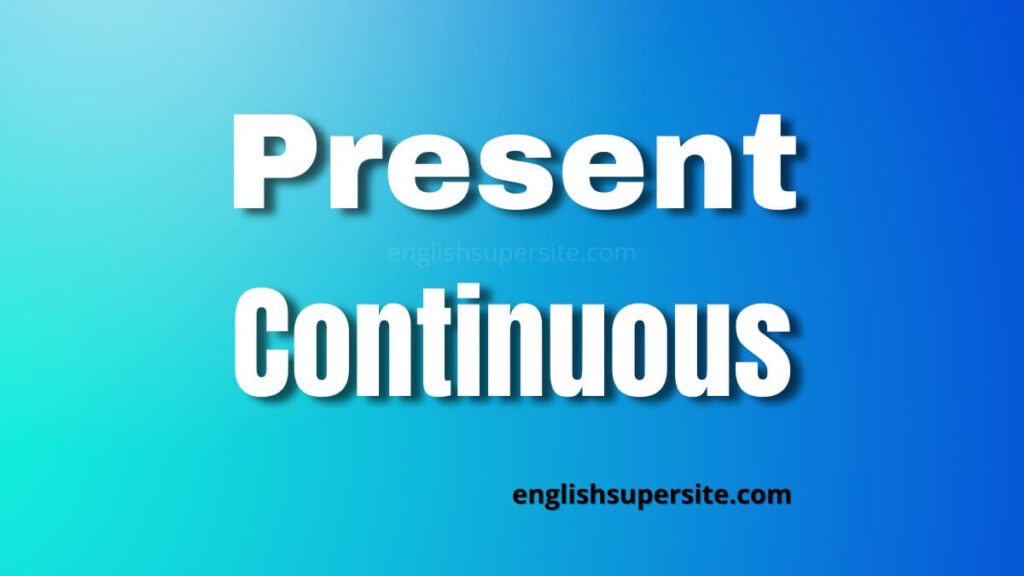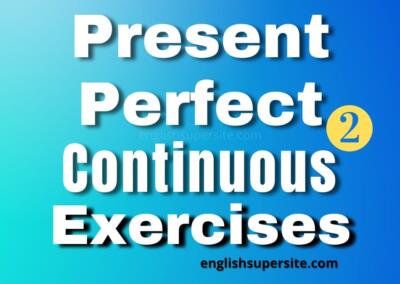
Present Continuous
Sometimes called Present Progressive, the Present Continuous is one of the verb forms associated with the present tense in English.
Quick Example
- You are studying English.
- You are not studying English.
- Are you studying English?
Form
| I | he – she – it | you – we – you – they |
|---|---|---|
| to be (am) + present participle | to be (is) + present participle | to be (are) + present participle |
To be: am / is / are
Present Participle: the form of a verb ending in -ing (infinitive + -ing).
Common Signal Words
- Now
- Right now
- At the moment
- At this moment
- Today
- Always
- Listen!
- Look!
Use
The Present Continuous is a verb tense used to express:
- What is happening now.
- Actions that started and are ongoing.
- Near future – Future arrangements.
- Repetition or frequency of an action.
- Changing situations.
1. What is Happening Now
Use Present Continuous when an action is happening at the time of speaking or around it.
- I am working now.
- We are speaking English.
- You are studying English now.
- Are you studying English?
- He is playing soccer with his friends.
- I am not playing the piano.
- They are listening to the radio in the mornings.
- The sun is rising, come and see, it is so beautiful!
2. Actions that Started and are Ongoing
We use Present Continuous to say that something is happening or we are doing something now, but sometimes this can mean: this very moment, this hour, today, this week, this month, this year, and so on.
- My sister is living in Florida.
- You are studying English to become fluent.
- I am watching a very interesting documentary on TV.
- Is she working on that project you gave her last week?
- This year is being tough.
3. Near Future – Future Arrangements
- I am visiting my brother next week.
- He is not coming to the party tonight.
- She is meeting her parents after lunch.
- I am not talking with him tomorrow about the project.
- I am inviting Mark to the party on Friday.
- They are watching the news in the evening.
4. Repetition or Frequency of an Action.
We use Present Continuous to emphasize the frequency or repetition of a an action.
- She is always forgetting her keys somewhere.
- The baby is always crying for no apparent reason.
- I am constantly telling you to study more.
- He is always coming to work late.
5. Changing Situations
- House prices are going sky high.
- Your English is improving a lot.
- Wow, Mary is getting taller!
- He is running a lot faster lately.
- I am taking it easy.
Study Also:
Examples
Present Continuous using Work (Regular Verb)
| Affirmative | Negative | Interrogative |
|---|---|---|
| I am working. | I’m not working. | Am I working? |
| You are working. | You aren’t working. | Are you working? |
| He is working. | He isn’t working. | Is he working? |
| She is working. | She isn’t working. | Is she working? |
| It is working. | It isn’t working. | Is it working? |
| You are working. | You aren’t working. | Are you working? |
| We are working. | We aren’t working. | Are we working? |
| They are working. | They aren’t working. | Are they working? |
Present Continuous using Go (Irregular Verb)
| Affirmative | Negative | Interrogative |
|---|---|---|
| I am going. | I’m not going. | Am I going? |
| You are going. | You aren’t going. | Are you going? |
| He is going. | He isn’t going. | Is he going? |
| She is going. | She isn’t going. | Is she going? |
| It is going. | It isn’t going. | Is it going? |
| You are going. | You aren’t going. | Are you going? |
| We are going. | We aren’t going. | Are we going? |
| They are going. | They aren’t going. | Are they going? |
Present Continuous using Study (Regular Verb)
| Affirmative | Negative | Interrogative |
|---|---|---|
| I am studying. | I’m not studying. | Am I studying? |
| You are studying. | You aren’t studying. | Are you studying? |
| He is studying. | He isn’t studying. | Is he studying? |
| She is studying. | She isn’t studying. | Is she studying? |
| It is studying. | It isn’t studying. | Is it studying? |
| You are studying. | You aren’t studying. | Are you studying? |
| We are studying. | We aren’t studying. | Are we studying? |
| They are studying. | They aren’t studying. | Are they studying? |
Study Also:
Abbreviations Cohesion and Coherence Collocations Comparative Conditionals Frequent Errors Future Continuous Future Perfect Future Perfect Continuous Future Simple Homonyms Interjections Journaling Learn English Linking Words Logical Flow Past Continuous Past Perfect Past Perfect Continuous Past Simple Plural Present Continuous Present Perfect Present Perfect Continuous Present Simple Pronunciation Question Tags Quiz Quotes Simple Future Simple Past Simple Present Spelling Superlative Transition Words
Share with your friends!






